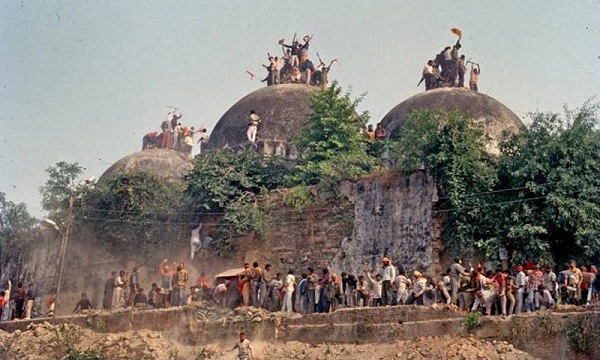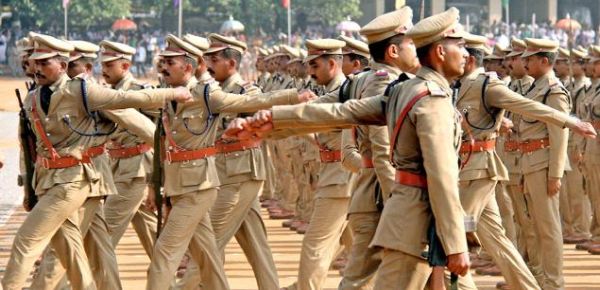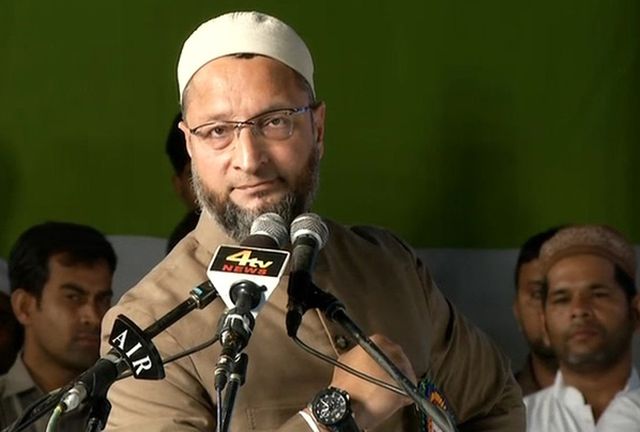
by Editor | May 25, 2021 | News, Politics

Justice Dipak Misra.
New Delhi : The Supreme Court on Thursday said it will deal with the Ramjanmabhoomi-Babri Masjid case as a pure land dispute and refused to hear it on a day-to-day basis.
Meanwhile, the All India Muslim Personal Law Board (AIMPLB), which is beginning a crucial three-day plenary in Hyderabad on Friday, demanded contempt of court proceedings against those speaking of building a Ram temple at the site of the razed Babri Masjid in Ayodhya.
Beginning the hearing, a special bench of Chief Justice Dipak Misra, Justice Ashok Bhushan and Justice S. Abdul Nazeer posted it for March 14, asking parties in the case to file English translations of the documents before it.
After senior advocate Rajeev Dhavan, appearing for one of the petitioners, sought day-to-day hearings, the bench refused saying: “Over 700 poor litigants are waiting for justice, we have to hear them.”
The court also said it will hear at later stage the impleadment applications of those which were not before the Allahabad High Court.
The court was hearing a batch of cross petitions challenging the 2010 Allahabad High Court verdict that had divided, in by a 2:1 majority, the disputed Babri Masjid-Ramjanambhoomi site between the Nirmohi Akhara, Lord Ram deity and the Sunni Waqf Board.
Additional Solicitor General Tushar Mehta, appearing for the Uttar Pradesh government, told the court that 504 exhibits, including books such as the Ram Charit Manas, Ramayana and Bhagawat Gita, written in various languages, have been translated and filed in the court.
The depositions of 87 witnesses have also been filed along with the Archaeological Survey of India’s reports as well as photographs. However, some translations are yet to be completed, he added.
The top court was moved challenging the High Court verdict by petitioners M. Siddiqui, represented by his legal heirs, the Nirmohi Akhara, the UP Sunni Central Waqf Board, Bhagwan Shri Ram Virajman, All India Hindu Mahasabha’s Swami Chakrapani, the Akhil Bharat Hindu Mahasabha, the Akhil Bharatiya Sri Ramjanam Bhoomi Punardhar Samiti and others.
Addressing reporters ahead of the AIMPLB meet, its spokesman Maulana Sajaad Nomani said those speaking of building a grand Ram temple at the site represented a “clear case of contempt of court” and that the court and the government should take action.
He said the Board would present its case before the Supreme Court and abide by its verdict.
—IANS

by Editor | May 25, 2021 | Opinions
 By Saurabh Katkurwar
By Saurabh Katkurwar
Locals, both Hindus and Muslims, say they were “outsiders” who came to Ayodhya in 1992 and stirred trouble while locals were busy saving each other – irrespective of their religious faiths – from the brunt of the riots that ensued.
Ayodhya : As India approaches 25 years of the apocalyptic demolition of the 16th century Babri Masjid on December 6, citizens of Ayodhya take pains to talk about their age-old heritage of cultural collaboration and free participation in inter-religious activities which has kept the secular fabric of the twin intact – despite the dragging temple-mosque politico-legal dispute over 2.7 acres of prime land whose ownership is contested by both Hindus and Muslims.
Locals, both Hindus and Muslims, say they were “outsiders” who came to Ayodhya in 1992 and stirred trouble while locals were busy saving each other – irrespective of their religious faiths – from the brunt of the riots that ensued. Out of the town’s total population of around 60,000, Muslims account for only six per cent. But they never felt any discrimination from Hindus, says Mohammed Chand Qaziana, priest at the Dargah of Sayyed Mohammad Ibrahim.
Qaziana said that the dargah was protected by local Hindus when the kar sevaks, or Hindu religious activists who came from outside the town, demolished the Babri mosque on December 6, 1992, on the ground that it was erected there by invading Mughal emperor Babar after razing a temple dedicated to Ram, the revered warrior-god of Hindus.
“This 900-year-old dargah has followers from the Hindu community as well, many of whom regularly pay a visit here. It is a symbol of our centuries-old harmonious existence. When it was attacked, our Hindu brothers formed a human shield around it and saved it,” Qaziana recalled to IANS.
Faizabad district, in which Ayodhya falls, has about 30 per cent Muslim population. Qaziana said there is an unannounced understanding among the people here not to fall prey to hate speeches of politicians and outsiders.
What makes communal harmony special here is the participation in inter-faith events and rituals – Muslims stitching clothes for Hindu deities, participating in Ramleela (religious theatre based on the life of Ram) or doing namaz (prayers) in Hindu religious places; and Hindus similarly contributing to mosque renovation or helping Muslim fellow townspeople in times of need.
Echoing Qaziana’s views, Barfi Maharaj, who identifies himself as a Hindu social worker, said the Masjid was razed on December 6 by Vishwa Hindu Parishad (VHP) hotheads and locals had no role in it.
“We were neither influenced by hate speeches nor did we participate in the demolition drive. It was VHP that brought outsiders to demolish the Masjid. How can people from the birthplace of Ram, who is known for his secular teachings, commit such a sinful act?” asked Barfi Maharaj.
Giving examples of inter-faith harmony in the town, he said that a mosque near Hanumangadhi in Ayodhya was being renovated by a Hindu mahant (priest) while a Muslim tailor had been stitching clothes for the idol of Ram that is installed in the makeshift temple at the disputed site of Babri Masjid.
Needless to say, whatever be the difficulties and complexities in the Mandir-Masjid issue, there will not be any negative impact in the socio-religious fabric of the city, feel the people of Ayodhya, once the kingdom of Ram, known for being a model of good governance in that era.
(This feature is part of a special series that seeks to bring unique and extraordinary stories of ordinary people, groups and communities from across a diverse, plural and inclusive India, and has been made possible by a collaboration between IANS and the Frank Islam Foundation. Saurabh Katkurwar can be contacted at saurabh.k@ians.in)

by Editor | May 25, 2021 | News, Politics
 Lucknow : Heavy security has been deployed across Uttar Pradesh, including Faizabad and Ayodhya, on the 25th anniversary of the demolition of the disputed Babri Masjid structure, police said.
Lucknow : Heavy security has been deployed across Uttar Pradesh, including Faizabad and Ayodhya, on the 25th anniversary of the demolition of the disputed Babri Masjid structure, police said.
Twenty seven additional companies of the provincial armed constabulary (PAC) have been deployed across the state.
Of these, six companies each have been deployed in the state capital and in Faizabad district, specially to keep vigil on the temple town of Ayodhya.
Ayodhya has been divided into four zones and ten sectors and prohibitory orders under section 144 have been clamped. Any form of protests, demonstrations have been completely banned.
While the Vishwa Hindu Parishad (VHP) has been celebrating the 1992 demolition of the Babri mosque as ‘Shaurya Diwas’, some Muslim organisations observe it as a black day.
All fire cracker shops have been asked to shut down and vigil has been stepped up around liquor vends as well.
Orders have also been issued to check roof tops, which in Uttar Pradesh are often used to stockpile stones and bricks to be used during communal clashes.
Director General of Police (DGP) Sulkhan Singh has asked the district police chiefs to step up vigil and keep a tab on elements who could try to foment trouble.
He also directed officials to clamp prohibitory orders if situation arises. There were intelligence inputs that some mischievous elements and various terrorist outfits might try to disrupt peace on the day.
Police deployed on duty has been asked to carry with them riot gears including helmets, body protectors, tear gas shells, rubber bullet guns for any emergency.
—IANS

by Editor | May 25, 2021 | News, Politics

Asaduddin Owaisi
Hyderabad : MIM president Asaduddin Owaisi on Tuesday said the Sangh Parivar wants to use Ram temple issue to save Narendra Modi in the 2019 general elections as he has failed on all fronts.
He said the RSS, VHP and BJP should not be allowed to polarize the voters on temple issue and justified the stand taken by Sunni Wakf Board’s lawyer Kapil Sibal in Supreme Court that the hearing of the title suit be deferred till the elections.
Talking to reporters here, he said a leader of VHP has announced that the temple construction will begin in October 2018 while RSS chief Mohan Bhagwat has stated that only a temple can come up in Ayodhya.
“These statements are all aimed at influencing and threatening Muslims and raking up the issue before the elections to save Mr Modi, who has failed to provide jobs, check farmers’ suicides and his actions like demonetization and GST have destroyed business in the informal sector. The elections should be held on these real issues,” he said.
“When you don’t allow release of a film in Gujarat on the ground that it will influence the elections, how can you ignore the impact the temple issue may have?” he asked.
The MP also dismissed criticism of Sibal in a section of media and said he was representing Sunni Wakf Board in the apex court and not the Congress.
He reiterated that Sunni Wakf Board need at least six months to present its arguments before the court as a voluminous record of 17,000 documents need to be translated.
Replying to a query, the Hyderabad MP sad Parliament can’t legislate on the temple till the matter is in the Supreme Court.
“We have separation of powers. The judiciary, executive and legislature are independent. If somebody wants to become a dictator, then people will decide,” he said.
Owaisi said the issue of Babri Masjid was not an issue of Muslims but a matter of justice.
“Even after 25 years of the demolition of Babri Masjid, the case against the accused who instigated people through their provocative speeches and which led to the demolition has not been heard,” he said.
He reiterated his support to the suggestion by Justice M.S. Liberhan (retd.), who had headed the commission probing the conspiracy behind the razing of the disputed structure, that the hearing of title suit be deferred till the criminal case was disposed of.
—IANS

by Editor | May 25, 2021 | News, Politics

Asaduddin Owaisi
Hyderabad : MIM chief Asaduddin Owaisi has said that the title suit of the Babri Masjid can be decided only on the basis of evidence and not on ‘aastha’ (faith) as the Sangh Parivar is demanding.
Addressing a public meeting here on Sunday, he voiced his apprehension that the Sangh Parivar might vitiate the atmosphere in the country on the issue before the 2019 elections to gain political mileage.
The Member of Parliament condemned the statements by the Vishwa Hindu Parishad leaders that the construction of the Ram temple in Uttar Pradesh’s Ayodhya will begin on October 18, 2018.
Owaisi wondered how they could make such a statement when the title suit was still pending in the Supreme Court.
He said such attempts could repeat the violence and bloodshed witnessed in the country in the 1990s during BJP leader L.K. Advani’s Rath Yatra and after the demolition of the Babri mosque. He warned that this could weaken the country.
The public meeting was organised by the Joint Action Committee comprising various Muslim organisations just days ahead of the 25th anniversary of the demolition of the mosque on December 6.
In 1992, on that date, a large number of religious volunteers or “Kar Sevaks” gathered in the temple town and demolished the 16th century structure, leading to widespread rioting and political crisis.
Taking strong exception to Rashtriya Swayamsevak Sangh chief Mohan Bhagwat’s statement that only a temple could be built in Ayodhya, Owaisi said: “Muslims would not be cowed down by such threats.”
“What is pending in the Supreme Court is title suit, which will be decided purely on evidence and not an aastha,” he said.
Owaisi said Babri Masjid was not the issue of Muslims but an issue linked to secularism. “This is an issue which will decide the course of this country,” he said.
The MP said he supports Justice Manmohan Singh Liberhan’s suggestion that the title suit should not be taken up for hearing till the criminal case relating to the demolition of the mosque was disposed off.
Owaisi also quoted former Chief Justice A.M. Ahmedi reportedly saying that had Justice Venkata Challaiah not permitted Kar Seva, it would not have led to the demolition of the Babri Masjid.
He said even 25 years after the demolition, the contempt of court case had not come up for hearing in the apex court.
The MIM president alleged that the BJP is returning to its real agenda as it has failed to provide jobs to the unemployed and demonetisation and the Goods and Services Tax has hit the people and dealt a blow to the economy.
Babri Masjid Action Committee convenor Zafaryab Jeelani said it was not an issue of “aastha” but of the political interests of some communal groups. He recalled that even the FIR registered in 1949 states that idols were stealthily kept in the mosque.
He said some elements tried to spread the falsehood that it was the birthplace of Ramchanderji (Lord Ram) but this has nothing to do with facts.
The speakers called up on Muslims to peacefully observe the shutdown on December 6 to demand reconstruction of the mosque at its original place.
—IANS




